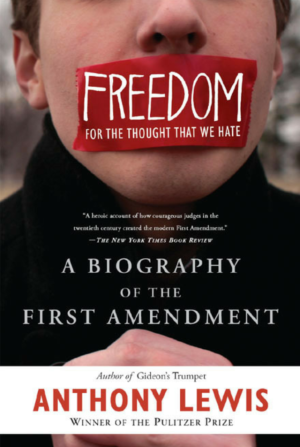 The late New York Times journalist Anthony Lewis, whose writings on the First Amendment are essential to understanding free speech and freedom of the press, wrote that the legal standard for incitement to violence may have swung too far in the direction of allowing just about anything. I wonder what he would have to say about the toxic right-wing stew in which the Buffalo shooter immersed himself — 4chan, according to reports, but reinforced by broader cultural developments in which Fox News and Trumper politicians have embraced virulent forms of racism.
The late New York Times journalist Anthony Lewis, whose writings on the First Amendment are essential to understanding free speech and freedom of the press, wrote that the legal standard for incitement to violence may have swung too far in the direction of allowing just about anything. I wonder what he would have to say about the toxic right-wing stew in which the Buffalo shooter immersed himself — 4chan, according to reports, but reinforced by broader cultural developments in which Fox News and Trumper politicians have embraced virulent forms of racism.
In 1969, the Supreme Court ruled in Brandenburg v. Ohio that a Ku Klux Klan leader demanding “revengeance” against Black people and Jews did not engage in incitement because his threat was non-specific. That is, he didn’t urge the mob he was addressing to march down the street and attack the first African American they came across. The idea was that the threat had to be “directed at inciting or producing imminent lawless action” is “likely to incite or produce such action” in order for it to rise to the level of incitement.
Did the court go too far? In his 2007 book “Freedom for the Thought That We Hate: A Biography of the First Amendment,” Lewis surveyed the landscape of the early 2000s and wrote this:
In an age when words have inspired acts of mass murder and terrorism, it is not as easy for me as it once was to believe that the only remedy for evil counsels, in Brandeis’s phrase, should be good ones. The law of the American Constitution allows suppression only when violence or violation of law are intended by speakers and are likely to take place imminently. But perhaps judges, and the rest of us, will be more on guard now for the rare act of expression — not the burning of a flag or the racist slang of an undergraduate — that is genuinely dangerous. I think we should be able to punish speech that urges terrorist violence to an audience some of whose members are ready to act on the urging. That is imminence enough.
The Brandenburg standard came into being only after many decades of evolution toward a less stringent understanding of incitement, beginning with Schenck v. United States (1919), in which Justice Oliver Wendell Holmes Jr. articulated the “clear and present danger” test. The decision, which includes Holmes’ famous admonition that you can’t falsely shout “fire” in a crowded theater, is widely reviled today, but it represented a step forward: It was the first time the court suggested that speech couldn’t be punished unless it presented such a danger.
If Schenck didn’t go far enough, perhaps Brandenburg, as Lewis writes, went too far. How can we redefine incitement in the age of social media? Breaking the connection between speech and action would have the effect of outlawing hate speech, which is currently regarded as coming under the protections of the First Amendment. Should we go down that road? Can we trust the current Supreme Court to do it in a way that addresses the problem without creating collateral damage? What unintended consequences would there be?
We have a horrendous mess on our hands. Hate speech on the internet presents dangers unlike anything we have dealt with before. As someone who’s pretty close to being a free-speech absolutist, I have real problems with any new government restrictions. But I do find it interesting that no less a friend of the First Amendment than Anthony Lewis had reservations about incitement. And Lewis was writing before social media and the dark web had gotten much traction.
We need a national conversation. Sadly, we are at a moment when we are ill-equipped for such an exercise.



